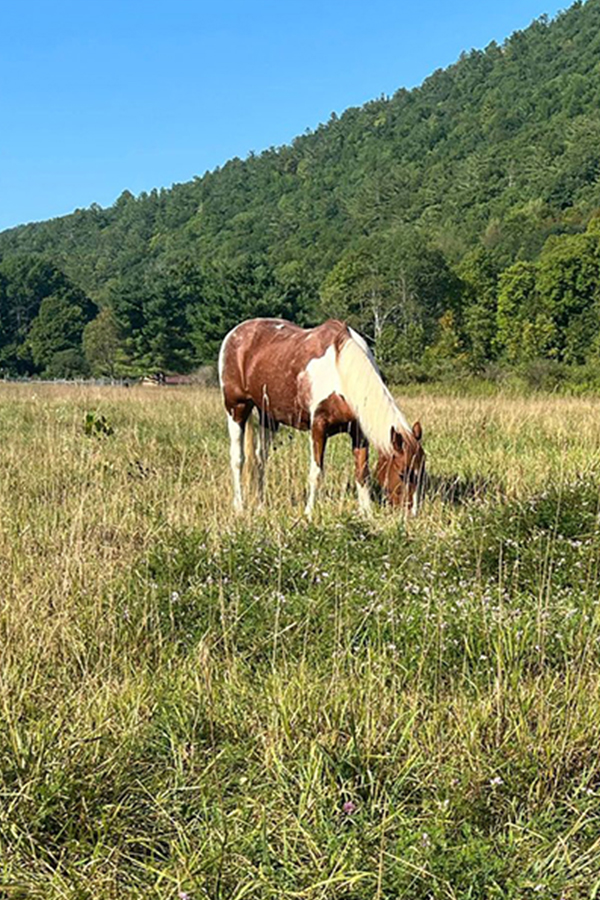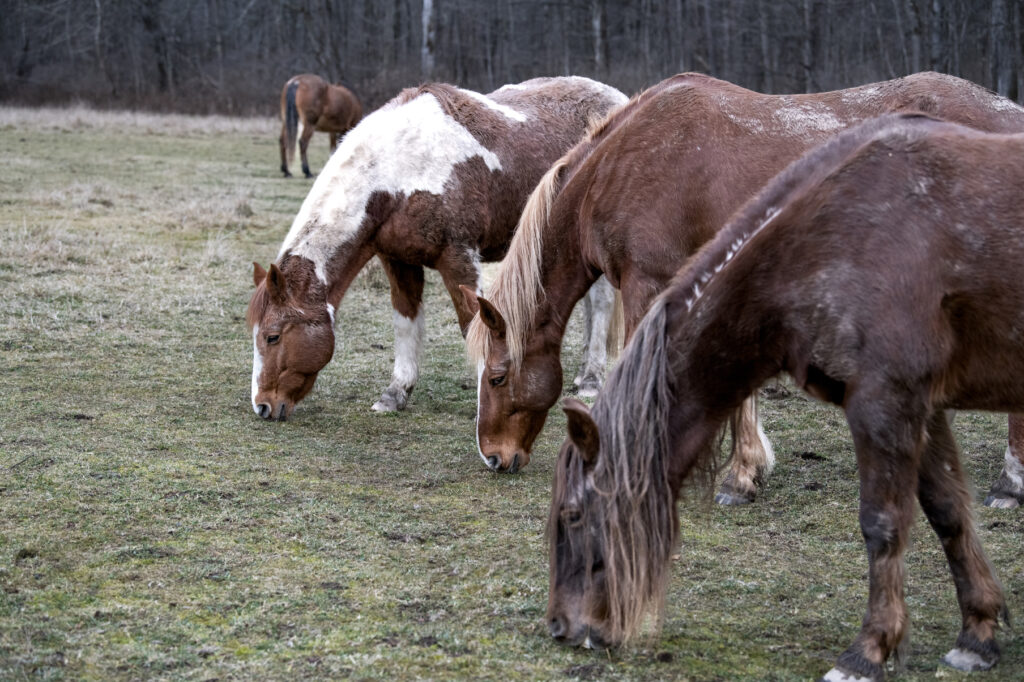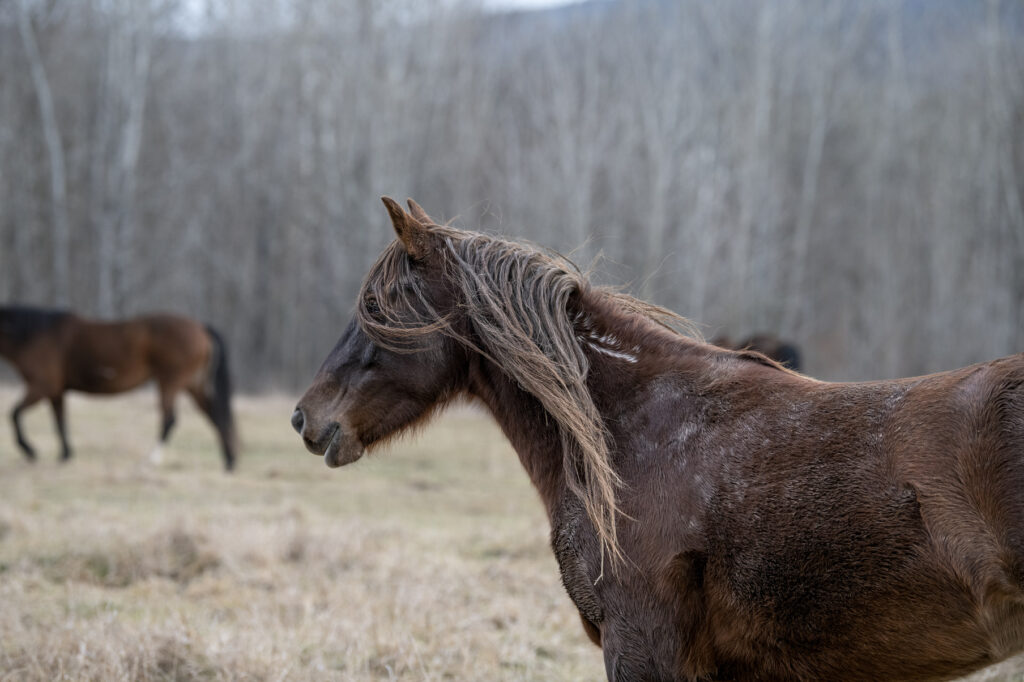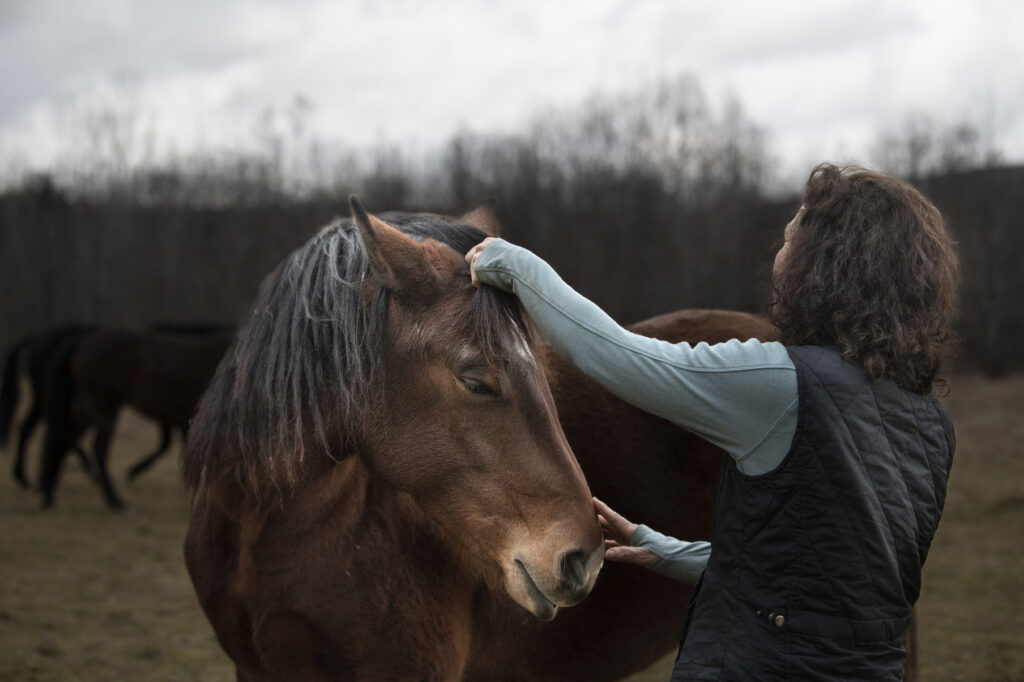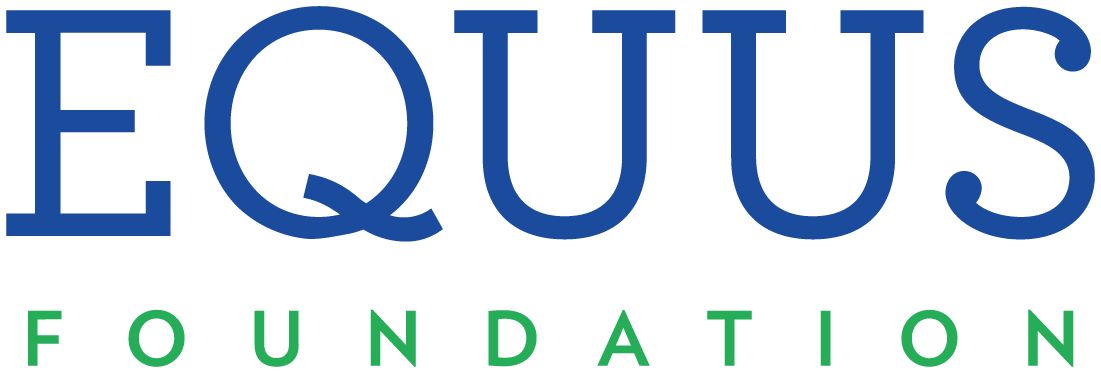Mary DeBonis has been rescuing and gentling wild mustangs for more than 20 years.
Across the sprawling acres of Mustang Valley Sanctuary, which is nestled in amongst the rolling hills of West Fulton, Schoharie County, DeBonis provides a home for mustangs and other horses she’s rescued over the years. She also provides horse therapy programs for veterans and domestic violence survivors.
A few years ago, it was a relatively small operation, with only a few stalls. However, this year, DeBonis has built more as she’s taken more horses on, in part because of an Adoption Incentive Program started by the federal government’s Bureau of Land Management (BLM) in 2019.
The aims of the program sound positive: to provide $1,000 to people who adopt a wild horse or burro from the BLM to reduce the cost incurred by the BLM to care for the unadopted and untrained animals.
Yet, in practice, an investigation from The New York Times found that some adopters take the money and send the horses off to slaughter auctions.
“This is the government laundering horses,” Brieanah Schwartz, a lawyer for the advocacy group American Wild Horse Campaign told the New York Times. “They call it adoptions, knowing the horses are going to slaughter. But this way the BLM won’t get its fingerprints on it.”
Since 1971, the BLM has managed the population of wild horses and burros through the Wild Free-Roaming Horses and Burros Act. Under it, the BLM is allowed to remove what it considers excess wild horses and burros on public lands, most of which stretches across a dozen western states.
The agency estimates that as of March 2021, there are 86,189 wild mustangs and burros on public lands. Last year, there were 95,114. In 2020, 10,824 of the animals were removed, typically through helicopter round-ups, which many activists and animal organizations deem inhumane. A total of 6,162 of the animals that were rounded up were placed into private care and 735 underwent fertility control treatments, according to the BLM. The removal, transportation, and care of these animals cost $91.191 million in 2020.
As of May, about 51,000 mustangs that have yet to be adopted or sold have been placed in government pastures, corrals and private ranches, which the BLM rents, as reported in the Times story. It’s costing taxpayers approximately $60 million per year.
From DeBonis’ perspective, the high price tag is just one of the many reasons people in the Capital Region should be paying attention.
“I just want to raise awareness. It just seems like so many people I talk to . . . they have no idea,” DeBonis said.
Since the adoption incentive program first started, DeBonis, who was featured in the national program called Extreme Mustang Makeover just a few years ago, has rescued more horses at a time than ever before.
“We put this extension on because I rescued nine from the kill pen last year. So then I had a total of 17 [horses] going through the winter and I didn’t have the stalls,” DeBonis said.
She’s a part of a network of people who are concerned about wild mustangs and connect with people in the know to purchase the horses from slaughter auctions and kill pens across the country and transport them to adoptees or sanctuaries like Mustang Valley.
Many of the mustangs she’s seen in the kill pens shouldn’t be there in the first place, whether because they should be in long-term holding or they were supposed to have been adopted out through the program.
“The main thing is right now, I’m pulling them from the kill pen. I have to pay 75 cents a pound. Then it costs me between $1,000 and $1,200 just to get them transported here,” DeBonis said.
“I shouldn’t have to take my hard-earned money and pull horses from the kill pen when somebody else is being paid for them, and basically, that’s what I’m doing. I’m working to support this,” DeBonis said.
She works as an outsourced chief financial officer and to fund mustang rescues has recently started to offer campsites at Mustang Valley Sanctuary.
She also worked to fund the John E. Quinn Foundation, which helps veterans with Posttraumatic Stress Disorder learn how to gentle a mustang.
Among the mustangs she brought in last year is Star, who had a freeze brand on her coat denoting that she’s supposed to be in long-term holding with a rancher.
“So the government thinks that she is being held by a rancher and is paying a rancher for her and she was in the kill pen,” DeBonis said.
DeBonis also rescued several other female mustangs, including Rosita, Shakira and Mikayla, who was pregnant at the time and has since given birth to a playful foal named Elena.
More often than not, there are other mustangs in need and DeBonis said she just tries to trust her intuition on which to try and rescue.
“I can’t believe I ended up with nine extra horses last year, but I don’t regret a moment of it,” DeBonis said.
Through natural horsemanship, DeBonis has been working toward gentling the mustangs that she’s rescued so they’re comfortable with her walking them and taking their tack on and off. She’s also teaching them to trust humans.
Some of the horses she’ll adopt out. However, she’ll only adopt out a horse if she believes it’ll be a good fit for both the horse and the adoptee.
“There are people that do want the horses and I say no because . . . I spent my hard-earned money to pull them from slaughter. I’m not going to see them end up in that situation. So the agreement with anybody who takes an animal from me is always I don’t sell them . . . There is no purchase price. You give a donation. And then I make them agree that if they don’t want the animal anymore it comes back to me,” DeBonis said.
Two recent adoptees are Lisa Zaccaglini and Mike Shuster of Sharon Springs. After meeting DeBonis and learning about the mustangs she rescues, they decided to adopt two of their own.
“It changed our lives,” Shuster said. “We didn’t have a barn, we didn’t have pasture, nothing. . . We did a year of five hours a day, building a barn and pasture and now . . . we have these horses and they’ve just changed our lives.”
They adopted the aptly-named Yoko and Lucy. The latter is sweet, like Lucille Ball’s iconic character, and the former tends to be more serious, like the famed artist and activist. Zaccaglini grew up caring for horses, while Shuster hadn’t had much experience with them, so there’s been a bit of a learning curve, which DeBonis has helped smooth.
“Mary’s awesome because she’s like the horse hotline,” Shuster joked.
Most recently DeBonis has also focused on getting the word out about the helicopter round-ups of the popular and often photographed Onaqui herd in Utah, asking officials to halt them.
“I think more people need to be aware of what’s happening, they need to see where their taxpayer dollars are going. I also want people to know that we have a wild horse sanctuary right here in the valley,” DeBonis said.
For more information visit mustangvalleyranch.com.
Join the Fight to Save Mustangs: Donate Today!
Mikayla’s story is one of many at Mustang Valley Sanctuary, where Mary and her team are dedicated to rescuing and gentling wild mustangs. Your support can help save more mustangs like Mikayla from the fate of a kill pen. By donating to Mustang Valley Sanctuary, you can help provide a safe and loving home for these magnificent creatures, giving them a chance to heal and thrive just like Mikayla has.




